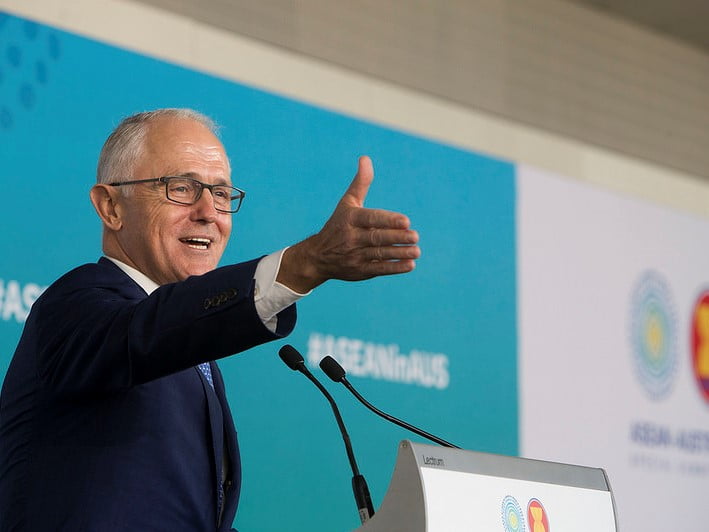Euro-trotting Prime Minister Malcolm Turnbull has been busy on the cyber front, signing Australia up to NATO’s Cooperative Cyber Defence Centre of Excellence (CCDCOE) as the nation joins in the fun of the world’s largest cyber war games.
Australia this week hops into ‘Locked Shields’, the world’s largest cyber defence exercise, which brings together more than 1,000 cyber specialists from 30 countries to protect an imaginary country from multiple cyberattacks.
To facilitate Australia’s participation with the NATO cyber defence group, Foreign Minister Julie Bishop opened Australia’s first ‘pop-up embassy’ in Tallin, Estonia, where the CCDCOE is based and where Locked Shields kicked off on Wednesday. NATO CCDCOE was established in 2008.

Ms Bishop said the embassy was temporary and would remain for 12 months and an Australian Defence Force member would be seconded to the Centre for a three-month period each year.
“Now, more than ever, we must engage with the international community to set clear expectations for responsible state behaviour in cyberspace. The international rules based order applies online, just as it does offline,” Ms Bishop said in a statement.
The Foreign Minister also launched the Cyber Cooperation Program, a project to boost digital service delivery among Indo-Pacific region governments that will be delivered by the Estonia E-Governance Academy and the Australian Strategic Policy Institute.
Mr Turnbull, who attended the Anzac Day dawn service at WW1 French battlefield site Villers Bretonneux, has been busy boosting Australia’s European cyber credentials.
In a speech in Brussels along with NATO Secretary General Jens Stoltenberg that came after signing up for CCDCOE, Mr Turnbull expanded on the need for cyber and general defence cooperation between Australia and NATO.
“In the face of security threats and strategic competition, we need to defend and extend the rules based structures that have enabled our common peace and prosperity,” the Prime Minister said.
“As the world’s foremost military alliance, representing 29 democracies, NATO is a major contributor to our common security,” he said.
“Whether it’s standing firm in the face of Russia’s malign actions, responding to the threat of terrorism in Afghanistan, helping ensure stability in Iraq or defending against cyberattacks. Together Australia and NATO are acting with purpose to defend our freedom and protect our security.
“We’ve discussed our work together on cyber with Australia yesterday becoming a member of the NATO CCDCOE.
“This week Australia will observe Locked Shields the world’s largest cyber defence exercise. Digital technologies are profound enablers but we must remain alert to the threats and do all we can to ensure that we are protected from increasingly malicious activities online.”
Prior to the Brussels gig, Mr Turnbull met with Brexiting UK Prime Minister Theresa May in London and the pair indicated during an on-record chat at Chequers – the state provided country house for British PMs – that cyber was top of mind.
Australia and the UK are in the ‘Five Eyes’ intelligence allies along with Canada, New Zealand and the US, and Australia joined the diplomat expulsion reaction to Russia following the nerve agent attack on an ex Russian spy and his daughter in Salisbury, UK.
“There is much for us to look ahead to, as well, as we look at some of the ways, some of the challenges we face in today’s world,” said the British PM.
“Some of which we talked about in the last couple of days, security and defence, cyber security particularly. But also in trade, the pressure you now see on protectionism exerted across the world.”
Mr Turnbull concurred.
“We’ve had very good discussions about cyber security, about national security issues and we’ll return to these today. Trade is clearly very high on your agenda as it always is on ours. Trade means jobs,” said Mr Turnbull.
Earlier at the CHOGM conference in London, Mr Turnbull signed Australia up to the Commonwealth Cyber Declaration, along with 52 other Commonwealth leaders.
The agreement will see Commonwealth nations work together to evaluate and strengthen cybersecurity and is being spruiked as particularly valuable in helping smaller states ramp up their cyber security and therefore fit better into the increasingly online global economy.
“The Commonwealth Cyber Declaration is a landmark document which builds on the work of the whole family of 53 member countries said Steven Malby, head of the Commonwealth Office of Civil and Criminal Justice Reform in a statement.
“It emphasises the important role that the Commonwealth can play in this area at a time when cybersecurity and the protection of people’s rights online is at the forefront of everyone’s minds,” he said.
Do you know more? Contact James Riley via Email.

